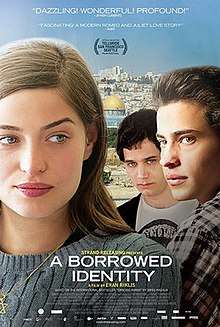A Borrowed Identity
A Borrowed Identity (Arabic: العرب الراقصون; Hebrew: זהות שאולה;) is a 2014 Israeli drama film directed by Eran Riklis. It is based on Sayed Kashua's book Dancing Arabs (2002). In Canada the film was released under the title Dancing Arabs,[2][3] which was the film's English-language title at its world premiere (one reviewer noted that the title "will prove tricky in marketing campaigns").[4] The film was considered a flop in Israel, with only 48,000 views, despite an $11 million budget.
| A Borrowed Identity | |
|---|---|
 Film poster | |
| Directed by | Eran Riklis |
| Written by | Sayed Kashua |
| Starring | Tawfeek Barhom |
Release date |
|
Running time | 105 minutes |
| Country | Israel |
| Language | Arabic Hebrew |
| Box office | $281,540[1] |
It tells the story of Eyad, an Israeli-Palestinian teenager from Tira who moves to Jerusalem to study at an elite Jewish high school, where he meets Naomi, a Jewish student, and falls in love with her. As part of his school-mandated community service, he meets Yonatan, who suffers from muscular dystrophy, and his mother Edna.[5]
Cast
- Tawfeek Barhom as Eyad
- Michael Moshonov as Yonatan
- Yael Abecassis as Edna, Yonatan's mother
- Danielle Kitsis as Naomi
- Ali Suliman as Salah, Eyad's father
- Marlene Bajali as Aisha, Eyad's grandmother
- Laëtitia Eïdo as Fahima, Eyad's mother
Plot
Eyad (Tawfeek Barhom) is a gifted Palestinian teenager who is accepted into an elite Israeli school. His father (Ali Suliman) drives to Jerusalem and drops the 16 year old Eyad at the new school. Before entering the school, Eyads Father tells him that the Palestinian people once longed to defeat their Jewish enemies, but will now settle for being able to live side by side with dignity. In school, he struggles to adapt, his Israeli peers refer to him as "Ayid" and is looked down upon by the others. Things change once he meets Naomi (Danielle Kitsis), he helps her with her chemistry schoolwork and the two start to meet at a cafe.
Yonatan (Michael Moshonov) is a disabled Israeli teen whom Eyad is assigned by the school to visit. Eyad and Yonatan get close and the two develop a strong bond since they are both considered outsiders. Back in school, Eyad and Naomi fall in love and meet up constantly, however, things begin to get complicated. Eyad excels in the classroom and begins to earn the trust and respect of his Israeli peers. He begins to sell falafel and bagels and starts to finally feel comfortable at the school. One day as Eyad and Naomi are walking in the streets, Naomi asks Eyad to tell her he loves her in Arabic, but an Israeli soldier overhears Eyad and asks to see his ID card and aggressively questions him.
In English class, Eyad and Naomi declare their love to the others and want to tell the world about their relationship. Once Naomi tells her parents about her Palestinian boyfriend she is no longer allowed to go back to school. Eyad also drops out of school and asks the principal to inform Naomi's parents that she can now go back to school since he is no longer there. The decision angers Eyad's father and he is no longer welcome home, so he moves to a flat in East Jerusalem and begins to seek work as a waiter. After many unsuccessful attempts he lands a job as a dish washer. By this point, Yonatan's health has deteriorated significantly and he is no longer able to move. Yonatan's mother asks Eyad to move in with them since she trusts him and cannot take care of Yonatan by herself.
Eyad realizes that him and Yonatan look alike, takes his Israeli ID and becomes a waiter. Yonatan's mother (Yael Abecassis) finds out but allows Eyad to continue as long as no one ever finds out. Using Yonatan's ID, Eyad takes Yonatan's final exams and scores highly for both of them. Naomi serves in the Israeli Army and tells Eyad that she is sick of lying and chooses to break things off. After a while, Yonatan passes away while, Eyad (posing as Yonatan) informs the Muslim authorities that the Muslim Eyad has died. Eyad and Yonatan's mother attend the funeral and the screen goes white.
References
- "A Borrowed Identity (2015)". BoxOfficeMojo.com. Retrieved 26 June 2016.
- Simon Houpt (15 May 2015). "Q&A: The Israeli director of Dancing Arabs on why he doesn't see his work as political". The Globe and Mail. Retrieved 7 November 2016.
- Bill Brownstein (14 May 2015). "Dancing Arabs is a tender love story – a Romeo and Juliet, Israeli-style". Montreal Gazette. Retrieved 7 November 2016.
- Jay Weissberg (7 August 2014). "Film Review: 'Dancing Arabs'". Variety. Retrieved 7 November 2016.
- Harman, Danna (8 July 2014). "Sayed Kashua: A 'Dancing Arab,' Caught Between Two Worlds". Haaretz. Retrieved 17 September 2015. (subscription required)